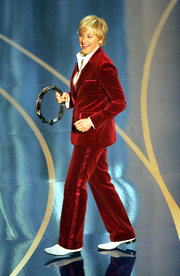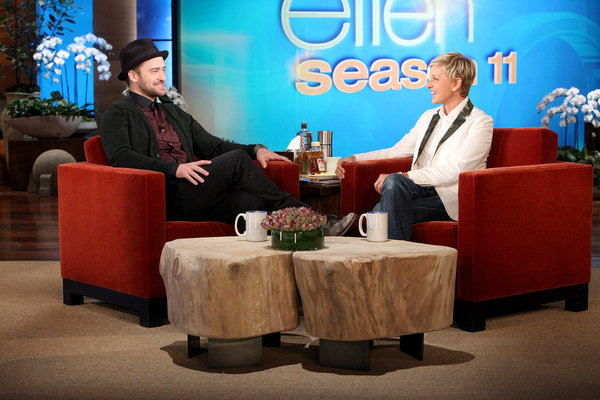
BURBANK, Calif. — Since 2011, when “The Oprah Winfrey Show” ended its stunning run, daytime TV has been on a desperate search for a new supreme ruler, a star capable of delivering more than enormous ratings (Dr. Phil can do that) and acting as more than a moral compass (bless you, Judge Judy). The job requires a person who can do those things while also serving as an arbiter of American pop culture.
Queen Latifah sure doesn’t seem to have it. “Bethenny” has also been a dud. Katie Couric’s heavily promoted attempt at assuming Ms. Winfrey’s throne ended last month with the cancellation of her “Katie.” Poof. Another aspirant shuffles toward the exit, joining Anderson Cooper, Kris Kardashian and Jeff Probst, to name just a few.
Maybe the New Oprah has been here all along. She’s a quirky lesbian with a soft spot for animals and a brand of observational humor that turned out to be tailor-made for social media. She’s a CoverGirl spokesmodel — at 55 years old. She’s most definitely a “Yep, I’m Gay” pioneer, as her Time magazine cover declared way back in 1997. On March 2, she will become a two-time host of the Academy Awards.

For Ellen DeGeneres, crowning herself the next daytime queen would no doubt be awkward: Ms. Winfrey is a neighbor and an occasional texting buddy. Ms. DeGeneres, who is more serious in person that you might expect, frowned when I tiptoed toward the topic. “Oprah is very business minded,” she said. “I’m just not that way. I’m happy my show is successful. But I am also just content just to be me.”
Later, she added, “All of us, whether we are in this business or not, have little voices that tell us we’re not good enough, and we don’t deserve it.”
“The Ellen DeGeneres Show,” now dancing through its 11th season and renewed on NBC stations through 2017, is surging in the Nielsens. Last month, about 4.4 million viewers tuned in each day — a show record. In the fall, she was up about 13 percent compared with the same period last year.
Ms. DeGeneres’s detractors (yes, she has them) will quickly snipe that she does not have “Oprah”-level ratings. That is true. Ms. Winfrey was delivering an audience of roughly six million when she rode off into cable semi-obscurity, down from a peak of about 13 million in the early 1990s. But a simple ratings analysis may be missing the point. Measurements of influence have changed. Now, power must also be evaluated with social media and online video in mind. And by that standard, Ms. DeGeneres has few, if any, equals.
With 24.4 million followers, she is one of the top television personalities on Twitter, where she identifies herself as “comedian, talk show host and ice road trucker.” She also has one of the most-watched celebrity channels on YouTube, where clips from her show have been viewed almost three billion times. On average, one “Ellen” segment a month goes viral. (Iggy the Dog — a media kerfuffle over her giving away an adopted dog — was just the beginning.)
No daytime talk show has more pull among sponsors, in part because the median income for the “Ellen” audience is 22 percent higher than the average for daytime, according to Nielsen data. Major advertising partnerships have included Burt’s Bees, Walgreens, Huggies, Target, Band-Aid, Best Buy and Swisse vitamins. CoverGirl saw a 55 percent increase in sales of a new foundation after it was featured in a show segment.
“The Ellen impact has been phenomenal,” said Esi Eggleston Bracey, general manager of CoverGirl Cosmetics. “She’s someone I would call a connector.”
Ms. DeGeneres is now working on her own branded products. “It’s not that much of a stretch for me to do a clothing or a furniture or a home line,” she said. Oh, and she has a parade of new movies and scripted shows in the works. She will voice the befuddled lead in Pixar’s “Finding Dory.” A big-screen comedy co-starring Rebel Wilson has been discussed. Ms. DeGeneres’s production company, which backs “Bethenny,” in recent months has sold other new shows to networks like CW and NBC.
All this from a woman who asserts that she is not all that interesting.
“I’m really pretty boring,” said Ms. DeGeneres, who married the actress Portia de Rossi in 2008. “It’s actually a problem, because I run out of things to talk about in my monologues. I love my home life. I love Portia. I love my animals. I love time off.”

With the Oscars only six weeks away, her free time of late has been sparse.
“We’ve been writing and writing and writing,” she said, with a smile, of preparations. “It’s like a soup. You put it all in, and you let it sit on the stove until it reduces to a delicious, flavorful broth.”
Walking in a brisk trot to a meeting across the Warner Bros. lot here — late for Ms. DeGeneres is early — she picked up the thought: “When people come to my show, they are already on my side. But hosting the Oscars is like jumping out of a plane. It’s a tough audience. It’s people who are jaded. To try to entertain them and make them laugh and make them relax and make them feel good is a challenge.”
This time around, however, she is feeling much more confident.
“I used to care so deeply about what people thought of me,” she said later in her dressing room, a kale salad awaiting her. “I just wanted to be liked. Now, I care that people get me. I want to be understood.”

Ms. DeGeneres said her agent had to coax her into accepting the gig. “I really thought, ‘Why do I want to add that to my plate?’ I’ve done it before, and it’s scary as hell,” she said. “If you do great, the reaction is that you were good. Not great — good. If you don’t do well, they just tear you apart, and they never let you forget it.”
If Ms. DeGeneres feels pressure to steady the Oscars following a year when the program’s host, Seth MacFarlane, was harshly criticized for what some viewers saw as offensive humor, she would not acknowledge it. “None,” she said, a chilly wind suddenly blowing from her direction. “A lot of people liked him.”
“I do think it should be classy,” she continued after an uncomfortable silence. “It’s the Academy Awards. It’s prestigious. It should be sophisticated. It has lately turned into something that’s a little more about the clothes than the performances, and I will comment on that.”
In person, Ms. DeGeneres speaks with the same off-kilter cadence as she does onstage and displays the same deadpan humor, albeit without the funny faces that soften it. She was not entirely thrilled to be spending the day with a reporter, noting on more than one occasion that she has felt burned by journalists. But her honesty makes you feel comfortable spilling your guts right back. Before I could help myself, I was showing her iPhone photos of my cat and oversharing about my lucky Ursula the Sea Witch boxer shorts.
To understand Ms. DeGeneres and her drive, you have to remember the hole she was in before the debut of her talk show.

After she came out of the closet, viewers abandoned her sitcom, and she felt like a pariah. “Gay people thought I wasn’t gay enough,” she said. “Straight people thought I was too gay. I remember thinking, ‘There’s an amount of gay I’m supposed to be?’ Suddenly, everyone was making fun of me, or at least it seemed that way. It was paralyzing. I didn’t work for three years.”
With time and a lot of Eckhart Tolle and Deepak Chopra — she now meditates for 20 minutes each morning — Ms. DeGeneres started to develop some new projects, including a talk show. “I had to pick myself up and stop feeling sorry for myself,” she said. “I didn’t have any money coming in.”
“The Ellen DeGeneres Show” was in some ways a response to the scrutiny and judgment that Ms. DeGeneres felt during that time. You can see it in the audience dancing that starts the show. You’re a bad dancer? So what. Nobody here will make fun of you. The show’s celebrate-who-you-are message not only resonated with the daytime audience, it also helped fuel a full-fledged cultural movement, in which bullying is not O.K., “Glee” just wants everyone to be friends, and more states allow same-sex marriage.
Her appeal is also based in contradiction. Older viewers (the median age for “Ellen” is 55) can feel cool or modern for relating to an out lesbian who seems to understand technology. But many of her jokes come in old-fashioned, comfy packages: Heads Up!, a popular “Ellen” segment (and now a hit iTunes app), is essentially charades. With her guests, she offers viewers a peek at an opulent life — mega-mansions, celebrity pals — but still manages a common touch that Ms. Winfrey eventually lost. No, I’m not fancier than you. I’m just a lucky lady bumbling through life.
“She has a skill that very, very few entertainers have, which is to make you believe that you actually know her, and that she could be your best friend,” said Martin Kaplan, the director of the Norman Lear Center for the study of entertainment and society at the University of Southern California.

“She even has a sense of irony about her niceness,” Mr. Kaplan added, noting a “nice-off” Ms. DeGeneres had with Jimmy Kimmel. (Guess who won.)
One factor in Ms. DeGeneres’s appeal tends to be overlooked: “Ellen” is an exceedingly well-produced show. Rubber hits the road at 11 a.m. each day at Warner Bros. with a production meeting in Ms. DeGeneres’s airy, sparely decorated office. (The most striking feature are two tabletop tree branches, each gripped by its own large wasp nest.)
“Everyone is scared to sit too close to me,” she said on one recent morning, as about a dozen young writers filed in and stood mostly at the other end of the room. Ms. DeGeneres was joking, but there was some truth to that tease. A few did seem terrified.
Still, the overall mood was jovial. A relaxed Ms. DeGeneres, drinking a bottle of Smart Water with one sneaker-clad foot on a coffee table, started by chatting about football and celebrity headlines. “That’s your haircut,” one producer said of Pamela Anderson’s new pixie. “Are you kidding?” Ms. DeGeneres responded. “That’s like saying all white people look alike.”
She was handed an eight-page draft script for the show, starting with her monologue, and the room fell silent as she put on her glasses and started reading. A producer softly chuckled here and there, but she stayed stoic. “I think we have to be more specific about the phone,” she said without looking up.
“Something other than the current ending,” she said, turning a page. “I think it ends with something like: ‘Don’t think about it. Don’t dwell on it. Just dance.’ ” The producers solemnly took notes, and the meeting moved on to other planned segments, including an appearance by Sting. “Make sure we have enough time for his whole performance,” Ms. DeGeneres said, or otherwise, she added, he would be annoyed.
From 1:45 to 2:15 p.m., she did a run-through of the planned episode, and more polishing was done. At 2:30 p.m., a different set of producers met in her dressing room and continued to brief Ms. DeGeneres on her guests. “His new CD is about the shipbuilding industry in England,” a producer said of Sting.
“It’s about time somebody wrote about that,” Ms. DeGeneres deadpanned.
And finally there was the finished draft of the monologue. Once more, the room waited in silence while she read it.
“I accept it,” she said. “Thank you.”